
Vol. 1, No. 26 Published by India China Division, Air Transport Command July 12, 1945
|
Vets, Civvies Eluded
Japs By One Step
Mountain Tops Skimmed In
Bad-Weather Operation
1350 BU, Kunming - More than a thousand French refugees - old men, women, babies, sick and wounded Foreign Legion soldiers - have been picked up at the Indo-China border and flown to safety by China wing planes.
Fleeing one step ahead of the Japs, hacking their way through the disease-infested, monsoon-soaked tropical jungles, the refugees made their own trails to two tiny landing fields in southern China.
ATC pilots flew C-47s into the soggy, turf-covered landing fields which required their greatest skill. The rainy weather necessitated skimming the mountain tops in order to keep under the clouds and maintain visual contact with the ground.
Hair-Raising Takeoff
"I would just as soon land in the Chicago stadium," said one pilot who had just made the difficult letdown. This field was located near a small town which had been ravaged by earthquakes, famine and cholera during the last ten years and was so backward that the people did not use wheeled vehicles.
The takeoff was just as hair-raising as the landing, perhaps more so, because of the extra load.
High hills bordering the field made it necessary to climb as swiftly as possible, but a friendly gap between two peaks gave the more sluggish ships a chance for a close clearance.
Medical Aid
Women and children were evacuated first, then old men and sick and wounded soldiers. Everyone was brought back to civilization without a mishap to mar a perfect flying record.
First stop was at Kunming where all the refugees were met by the local French vice consul and taken to a hospital stepped up in capacity to care for the number that needed immediate attention. They also were given food, clothing and necessary toilet articles to prepare them for the flight over the Hump.
In India they were taken to French communities below Calcutta for further recuperation and from there a large number were scheduled to ship by boat to France.
Grizzled veterans of fighting in Europe and Africa told of spending three years in the torrid climate and seeing their comrades die by the hundreds from tropical disease, Jap torture and malnutrition. Added to that was the constant worry of what was happening to their families in France, because no mail had reached them in Indo-China for more than three years.
Holes, Patches
Nine out of ten of the evacuees wore on their backs the only clothes they possessed and these were filled with holes and patches. The majority had not shaved for three or four months and some wore straw Chinese sandals as their only foot protection during hundreds of miles of cross-country walking.
All were eager for the latest news of the war in Europe which they were surprised to hear had ended. When they arrived at the modern Kunming airbase, their eyes opened wide and each person was visibly impressed with the array of latest fighting equipment. A French interpreter said that their usual exclamation upon landing was, "This is the way to run a war."
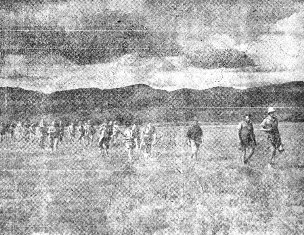 Weary French Foreign Legion and civilian evacuees struggle into Szemao, China, to board an ICD C-47, last lap on a
600-mile trek out of Jap-held Indo-China.
Weary French Foreign Legion and civilian evacuees struggle into Szemao, China, to board an ICD C-47, last lap on a
600-mile trek out of Jap-held Indo-China.
|
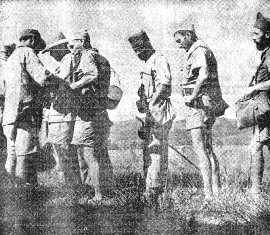 Chinese customs representatives inspect the personal belongings of the refugees before they board the transport.
Chinese customs representatives inspect the personal belongings of the refugees before they board the transport.
|
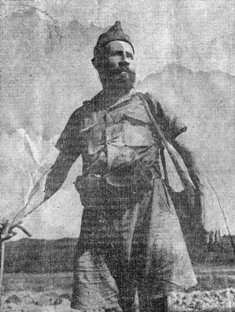 A bearded veteran pauses for one last look at the country left behind, with its vivid memories of Jap torture, starvation
and disease.
A bearded veteran pauses for one last look at the country left behind, with its vivid memories of Jap torture, starvation
and disease.
|
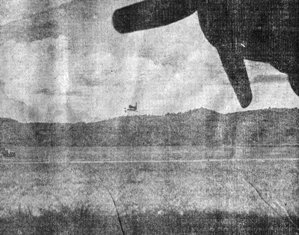 A close clearance is made by a C-47 on a takeoff to Kunming and civilization.
A close clearance is made by a C-47 on a takeoff to Kunming and civilization.
Brings Freedom to French Folk |
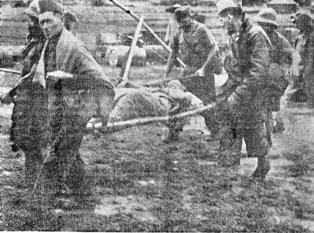 A wounded legionnaire is carried to one of the ATC rescue planes, bound eventually for a hospital where needed medical
attention will be given.
A wounded legionnaire is carried to one of the ATC rescue planes, bound eventually for a hospital where needed medical
attention will be given.
|
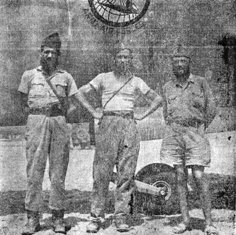 Three veterans, grimy, dysenteric and tired, pose in front of the plane in which they were rescued.
Three veterans, grimy, dysenteric and tired, pose in front of the plane in which they were rescued.
|
First Plane Arrives At New China Base
1360 BU, Luhsien, China - The arrival of the first cargo transport turnaround aircraft made history here recently when C-46 aircraft No. 280, carrying a heavy load of high octane gasoline, was unloaded, checked over, and on its way back across the Hump in 37 minutes. Later that afternoon the turnaround time was reduced by five minutes when C-46 aircraft No. 296 unloaded and hit the blue in only 32 minutes.
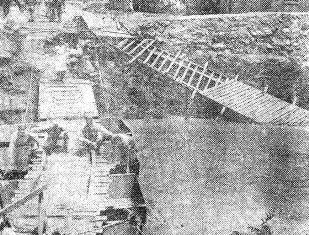 Swirling waters caused by a flash flood swelled streams in the vicinity of the general hospital at Kunming, tore
through the compounds and ruined much property. Many patients were evacuated to safer areas, the more
serious
cases being brought Indiaside by plane. Col. Leonidoff, CO, and ward men examine a bridge torn from its foundation.
A temporary pontoon bridge provided the only means of crossing the stream.
Swirling waters caused by a flash flood swelled streams in the vicinity of the general hospital at Kunming, tore
through the compounds and ruined much property. Many patients were evacuated to safer areas, the more
serious
cases being brought Indiaside by plane. Col. Leonidoff, CO, and ward men examine a bridge torn from its foundation.
A temporary pontoon bridge provided the only means of crossing the stream.
|
Sampan Gals, Shopkeepers
Find Business Negligible
Upon Returning to Nanning
'Red-Lighters' Draw Few Customers
Among Chinese, GIs
By S/Sgt. C. A. Zellinger
Nanning, China - Some of the first people back into Nanning when the Japs left were the sampan girls.
These are the mobile counterparts of the old-fashioned red-light districts. Barges, filled with girls, line the river bank at Nanning and gaily-clad figures beckon the few American and Chinese soldiers now in town to come aboard for a good time.
Not all these barges are occupied by sampan girls, although the percentage runs high. Some boats are homes; some little shops. Even restaurants float along the river. They lie moored to the banks not more than a foot apart. People walk from one sampan to another for almost a mile.
Baffled Landlubbers
Lights, laughter and music give "Sampan village" a gay atmosphere in the early part of the evening. Later, when the lights go out and the noise dies down, there are few Americans who venture into the waterborne village.
Changing currents in the river keep the landlubbers baffled. One night an excellent little eat shop may be located just off the bank at a certain street. The next night GIs might have to explore the entire river bank, climbing along paths that would challenge a mountain goat. In the end they may find the same sampan - then again it may be way out in the outer rim of barges, having been crowded out by competitors.
When a shopkeeper doesn't like his location, he casts off and boats to a vacant spot that looks more profitable to his trade. The sampan girls, too, find this amusing. They enjoy mooring their boats near restaurants where they can call across the water to soldiers eating rice and chicken.
If the sampan girls expected much when they returned, they were disappointed. The sampan shopkeepers, too, find trade restricted. Chinese soldiers don't have any money, and Americans will not exchange their gold dollars for CN because the rate is too low. For a good old U.S. sawbuck a GI receives only $9,000 CN, whereas in Kunming and Chungking the same bill will fetch 12,000 and upward.
But the girls and other sampan-dwellers are happy even though business is negligible. They are back in Nanning and it's fun to flirt with soldiers and to go ashore to walk old familiar streets. And, of course, if things don't pick up, they can cast off and float to a more profitable town.
There's Nothing Like Making Parking Space
1352 BU, Mohanbari - Short short story by 1st Lt. Percy J. Healey, Detroit, search and rescue pilot:
"Started in Ledo (in L-5) to pick up supplies, but hit impassable weather and had to make a forced landing on the Stilwell Road. To let traffic by (China-bound convoy) a passing road grader leveled off a ten-foot area at the side of the road - onto which the aircraft was pulled. After two hours the storm passed, and a successful takeoff was made. Returned to Ledo."
Letters Are Swell, But Let's Keep Off Monetary Matters
Chabua, Assam - In 14 months overseas, Pfc. Aaron Michalofsky, Brooklyn, has managed to establish correspondence relationships with damsels on three continents, Europe, Africa and Asia, where he was stationed before coming to ICD. Intrigued by a recent letter from a French girl in Fez, Oran, whose first two words he was able to translate as "My love," Pfc. Michalofsky was on pins and needles until he could hear the rest.
A staff sergeant came to the rescue, and the eager GI relaxed while the obliging sergeant read: "My love, please send me a little money for which I'm thanking you in advance..."
Now the disillusioned GI is writing to pretty damsels on only two continents.
French Legionnaires Are Guests of Men at Chabua
Chabua, Assam - Members of the French Foreign Legion and the French Colonial Army, recently evacuated by ICD from the Indo-China border to safety, became the guests of a group of GIs here for a tour of the base.
Four Legionnaires, Georges, Joseph, Dominick and Paul, were met by S/Sgt. Eric Daniels, NYC; Pfc. Anthony Crookston, Barberton, Ohio, and S/Sgt. Harry R. Yotter and Pfc. Michael Solomon, both from Allentown, Pa. Linguist Daniels acted as interpreter and asked the foursome what they would care for most. The answer was a tour of the base, so they could learn how the American GIs live.
While learning of the experiences of the French veterans, their hosts introduced them to such American institutions as Baby Ruth's, Tootsie Rolls, Schlitz beer, cokes, and a Chinese-restaurant dinner.
Through interpreter Daniels the Yanks heard of some of the methods employed by the Japs during their Indo-China invasion. First hordes of apparently friendly Nip civilians arrived and settled in the area neighboring the Legion post. The invasion was preceded by fifth column activities by these civilians. Then Jap battleships entered the harbor. When fighting began the Frenchmen were outnumbered 50-to-1. The Legionnaires were ordered to join the Japs against the Allies, "or else."
One garrison was attacked in the fortress and battle raged for three days without interruption. When the Japs finally entered, they found 16 men holding the fortress, whereupon a Jap officer approached the French OIC and congratulated him for prolonging the resistance so long. No sooner had the congratulations been tendered, however, than he raised his saber and decapitated the French officer with one stroke. The others were tied together and each was slashed behind the neck with the same sword. One was struck across the shoulders instead of on the neck, and lived to tell of the atrocity.
Legionnaires Grateful
Chief Corporal George Tirel, 26-year-old artist, showed that the Legionnaires hadn't lost their sense of humor during the long march over the mountains. He proudly displayed some of the cartoons he had sketched on the way.
Grateful for the American' hospitality, he distributed his drawings among his American friends. As another gesture of friendship he cut his Legion insigne from his shirt and offered it as a souvenir. The others did likewise, and the GIs in turn gave them ATC insignia.
Pilot Commended By CG for Skillful Two-Engine Landing
Hq., Calcutta - The narrow escape of F/O John D. Meek, forced to make a two-engine landing recently when two engines of his C-54 failed on a routine cargo mission to China, was revealed in a letter of commendation from Brig. Gen. Tunner.
F/O Meek, pilot with the 1346 BU, Tezgaon, was 45 minutes from his base at an altitude of 14,000 feet, the plane loaded with 33 large barrels of gasoline, when number three and four engines failed.
In the attempt to jettison as much cargo as possible, a gasoline drum struck the bottom section of the rear cargo door, which in turn blew off, striking the left horizontal stabilizer and elevator, doing considerable damage to both.
The pilot's skillful landing of the four-engine aircraft, with two engines out on one side and a severely damaged empennage, was credited with saving not only the bulk of the cargo but also the lives of all crew members.
Vigilant Mail Clerk Puts Finger on Hump Express
Hq., Calcutta - Let's be careful what we write on the envelope, men, when we send this caviar-wrapper home.
Cpl. Howard Harris, of this headquarters, has received a letter from his mother in Dallas saying that she had been made to pay air mail "postage due" on an arriving Hump Express. Cpl. Harris' sister took the paper and envelope to a sub-PO and demanded an explanation.
"Why, that's air mail, sure enough," said the clerk.
"Where do you see 'air mail'?" she demanded.
"Right on the envelope it says 'Hump Express,' replied the clerk. "Don't you know what that means? Air mail, over the Hump."
So now Cpl. Harris writes "newspaper" on the envelope, perhaps flattering the rag, but protecting his mother.
|
Nay Malum, Sahib, Nay Malum Shirt, Nay Malum Nuthin' 1307 BU, New Delhi - Wholesale pilfering on washday was brought to a close here recently by the firing of the entire crew of dhobis. But little mysteries continue to demand the keen eyes of small-time Perry Masons. Consider the confoosin' case of Pfc. John L. Delehunt, local flight traffic clerk. Just back from a trip, he discovered that a brand new American T-Shirt was missing from his laundry bundle. The dhobi was summoned but in dhobi-manner shrugged his shoulders and professed to "nay malum T-Shirt." Giving up in disgust, Delehunt ordered him out. Then something about the retreating laundry wallah caught his eye. He wore a brand new T-Shirt! A quick order to halt, a closer examination and the flight clerk had located the missing shirt. Off it was stripped amid dark oaths and bloody threats from Delehunt. The dhobi looking him in the eye was frankly unashamed. Denuded of his prize he continued to mutter, "Nay malum, T-Shirt." |
Assam Doctor Bags Tigers,
Conquers Superstitions in
Making Jungle Sick Calls
Valley Medic Ties Frank Buck
With Exploits in The Tropics
Misamari, Assam - Jungles, reptiles, wild animals and native superstitions are only a few of many obstacles to be overcome by Dr. Gerald G. King, "country doctor" whose patients live on the border of Bhutan.
His routine life, as described by Lt. Saul J. Seiff and Sgt. John Pack, of 1328, after a recent visit to that locality, would sound like a Frank Buck story to the doctors back home.
Employed by the Tea Planters Association as medical supervisor in charge of the many dispensaries on the various estates, Dr. King finds it pays to carry a rifle at all times along his trek of duty.
Personal experience has revealed that there's more to his work than curing a sick native when he gets a call, and it is not unusual for the American doctor to bag a tiger or two before arriving at the sick man's hut.
Persuasive Force
Mode of travel depends largely on the route and may range from the modern automobile and truck to the ancient bullock cart and ponderous elephant. The doctor makes one routine call over a river that can be forded only by means of a foot suspension bridge.
Native superstitions, according to Dr. King, are a continuous problem, and when an operation is necessary, the villagers rarely submit without a little persuasive force, preferring to go to their familiar "sastra wallah" who practices magic.
Dispensaries
These treatments, dating back hundreds of years, are colorful but not effective, consisting of killing a fowl as an offering to appease their god. Typical superstitions, Dr. King says, are branding the abdomen of newborn infants to keep them free from bowel diseases and stringing roasted garlic into necklaces to ward off evil spirits.
Not all the natives are superstitious, however, and Dr. King is assisted in his work by native Indian doctors in charge of the individual dispensaries.
It's been a long time since the Indiaside country doctor practiced in the States, but he manages to keep abreast of movements in modern medicine by reading, and right now he's content to treat his Indians, relax occasionally at the local club with a game of billiards, and collect stories to take back home.
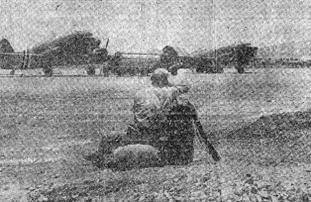
|
|
China Wing Headquarters, Kunming On his way after 30 months in CBI, a dogface looks westward over the Hump foothills near Kunming towards India and towards home as he sweats the plane that will take him on the first leg of the dreamed-of journey. The photog had asked what this forlorn-looking person was doing on the edge of the runway, and had been briefed by the passenger officer. The home-bound one had arrived three and a half hours before his ship was due to take off, and breathes there a man with soul so dead as to blame him? |
Near Battle For Chinese
Locals vs. Transients in Faction Fight, No Shots Fired
Nanning, China - A near-battle between different factions of the Chinese Army temporarily held up activities here one day.
It started between some transient Chinese soldiers and the home guard.
Home guard soldiers are poorly equipped and know little regimentation. Troops here from other parts of China have better weapons and are well clothed. There is some resentment among the home guardsmen who think that while they stayed and resisted the Japs the others had moved to healthier grounds. Transients, having tasted battle elsewhere, believe themselves the better soldiers.
Two guards started the argument. Soon the local soldier was joined by some of his buddies, armed to the teeth. Not to be outdone, the newcomers marched an entire platoon to the scene. Men from both sides brought tommy guns and grenades to the middle of a field where battle was to be held. American GIs, unarmed, looked on suspiciously.
Someone - GIs weren't close enough to find out - pacified both sides and the home guards went back to their posts, and the transients, to their tents.
CHINA This Week
by Dwight Coolie
FALSE FACE...
Hallett Abend, news columnist and war correspondent, tells this one:
A friend of his, a doctor, was closing his office in China one evening when the nurse brought in a peasant couple. They were decked out in a bunch of patched rags. The man carried a little girl in his arms who was bent double with pain.
Doc decided the child was suffering from acute appendicitis. An immediate operation might save her life. He told the couple. Before they would agree to the operation they demanded to know how much it would cost.
Figuring that the folks didn't have much money - if any - and that it would, at best, be a charity case, he decided to take it easy on them.
"$500 Shanghai." (Worth about 50 GI smackers.) The man agreed but insisted that the price be written down on a slip of paper and that the doctor sign his name to the agreement. So it was done.
When the medic said the girl must be taken to the hospital, immediately, that he would call a cab, the old lady said there was a cab waiting. When he arrived at the hospital, a nurse smiled at him.
"Boy, you should get a fat fee from this case." Recalling the rags, the air of poverty and the 50 bucks he probably would never see, Doc couldn't figure it out.
"Well," said the nurse, "they've already made arrangements for a private room, a day nurse, a night nurse and all the special trimmings. Naturally you should come in for your share of the expenses."
"But, the peasants, those rags..."
"Oh, them. That's just the gardener and wife. The little girl's father is president of the railroad company!"
Darn clever these... JE L'ATTAQUE...
Someone has dug up an old saying in China that "soft doughnuts will be picked up first." They use this axiom to point out that "jeep girls" are most often attacked because the attackers consider women the most vulnerable to attack.
Forward! To the attack!
DANCE, CLOWN DANCE...
Eight new dance halls have been or will be opened in Chungking. Authorities say that they recognize ballroom dancing as an essential part of social intercourse. That makes everything fine.
Except for one thing. More Chinese than GIs are going to dance. Which leaves us with another contribution to China. First it was aircraft, then artillery, gold and oil and now we are teaching them to dance...
RICE AND RAGS...
Ever since Pearl Buck left China to cover the Orient from the home front, the literary pictures of life in China have been a mite less colorful but perhaps a little more accurate. One of the latest to have a claim to knowing the most about the Far East is a Congressman, Walter H. Judd (R, Minn.).
Wise in many ways, Judd gives an enlightened report on China. Pointing out that after the sons of heaven dropped their dirty stuff at Pearl harbor, the American people immediately latched onto the Chinese as allies who were wholly selfless in their devotion to their country, Judd shows how the opinion is beginning now to swing the other way.
In other words, as the Congressman put it, "...to hear them (the Allies) talk now, all Chinese are lazy, are crooks and grafters... more interested in preserving themselves than in defeating Japan, expecting us to do all the fighting."
We realize, as does the good man Judd, that somewhere between these two extremes there is a true picture to be found.
XX Praises ICD's Work During Year
Gen. Smith Thanks ATC Men for Helping Bomb Tokyo
Hq., Calcutta - B-29s of the Twentieth Bomber Command have left the I-B and C Theaters to take the fight to Tinian and other islands of the Pacific which are nearer the main line to Tokyo's defeat.
While the Superforts were operating in this theater they chalked up new records and many unprecedented
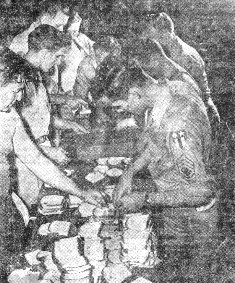 1305 BU, Dum Dum - Members of the "Masters" group (six-stripers) at 1305, whose most vivid memories of lowly
details in Uncle Sugar are of pulling the now little-known KP gave in to their innate urge to really work recently and
volunteered to make the sandwiches for the lower graders at the last base dance in the "Monsoon Square Gardens" of
Calcutta.
1305 BU, Dum Dum - Members of the "Masters" group (six-stripers) at 1305, whose most vivid memories of lowly
details in Uncle Sugar are of pulling the now little-known KP gave in to their innate urge to really work recently and
volunteered to make the sandwiches for the lower graders at the last base dance in the "Monsoon Square Gardens" of
Calcutta.
|
In a letter bidding farewell to these theaters, Brig. Gen. Joseph Smith expressed his gratitude and appreciation for the aid ICD and its men had given the Twentieth.
"There were many times," the letter read, "when the success or failure of the missions of the XX Bomber Command depended upon the delivery of gasoline and supplies during extremely bad weather. Not once during our year of operations were our missions curtailed because of the lack of supplies, owing to the timely help given by members of your splendid organization, often entailing efforts of your personnel far beyond their normal duties.
"It is a great pleasure," Gen. Smith concluded, "for me to commend the officers and men of your command for their splendid co-operation and unselfish assistance to the XX Bomber Command..."
It Ain't So Bad in Uncle Sugar,
Radio Op Gains 42 Pounds
Bangalore, India - It was with a great deal of doubt that members of this base will read of growing food shortages in the States since Cpl. Elmer E. Tate, Ontario, Calif., returned after 45 days in Shangri-la.
When departing this field for his vacation, Elmer's sylph-like figure tipped the scales at a mere 190 pounds. Upon his return some 70-odd days later, he resembled the "before" of a "before and after" reducing advertisement. The scales disclosed the horrible truth. Elmer had gained 42 pounds during his leave.
When questioned about his added tonnage and why he ate so much, he indignantly replied, "I didn't eat a lot," and then blushingly added, "I just ate often."
It is doubtful that "Mrs. Elmer" realized her cooking would be detrimental to the war effort, but it goes without saying that the additional bulk of Cpl. Tate, who is a flying radio operator, will cut down on the amount of cargo that can be placed on the same airplane with him.
Men of 1344 Long For the Old Days and Bomber Raids
1344 BU, China - "Oh, for the good old days," is the byword of the men here, who longingly recall the days last fall when Jap air attacks were a common occurrence and many a cold, miserable night was spent in a slit trench with enemy planes buzzing unmolested overhead.
The inconsistency of the "out of the frying pan into the fire" situation is that men here would gladly trade the excitement of those days for the influx of "big wheels" from rear echelon units, who formerly left this base strictly alone.
The raids, it is said, bolstered the morale of the men - made them realize what the were working for.
Although some men suffered wounds from fragments of an anti-personnel bomb during one of the raids, the incident that is related with the most feeling is the case of the officer who claimed, and eventually was awarded, the Purple Heart for a cut he sustained in diving for a slit trench.
 The Yanks at 1347 BU remembered the Fourth of July, despite their distance from the States,
and celebrated at a carnival complete with all the trimmings At the left, M/Sgt. Vesper Ward, an AM, and his
pachyderm lumber in, first by a rump, in the feature elephant race of the day. The mahout took care of the chauffer
detail. In the next photo the men are reminded of their days at Belmont or Pimlico as they place
pari-mutuel bets on
the pony and elephant races. No Fourth would be complete without fireworks, snapped in the next shot. At the
right the boys take their chances on the toss of elephant dice, wagering up to three rupees per toss at various stands.
The whole affair was non-profit, with excess rupees swelling prize money at sports and other events.
The Yanks at 1347 BU remembered the Fourth of July, despite their distance from the States,
and celebrated at a carnival complete with all the trimmings At the left, M/Sgt. Vesper Ward, an AM, and his
pachyderm lumber in, first by a rump, in the feature elephant race of the day. The mahout took care of the chauffer
detail. In the next photo the men are reminded of their days at Belmont or Pimlico as they place
pari-mutuel bets on
the pony and elephant races. No Fourth would be complete without fireworks, snapped in the next shot. At the
right the boys take their chances on the toss of elephant dice, wagering up to three rupees per toss at various stands.
The whole affair was non-profit, with excess rupees swelling prize money at sports and other events.
|
1347th Has Gala Fourth with Races, Eats, Bouts
Shamshernagar, India - Personnel at this base celebrated the Fourth of July with a Stateside festival.
Fun-packed with track and field events, pony races, baseball and other novelty games, dotted with concessions, gambling games and lots of eats, the carnival was attended by thousands of ICDers and guests from the nearby ASC and a Negro truck company who let themselves go for a holiday.
The whole show was a la Coney Island, with a background of carnival, swing and air force music supplied by the 765th AAF Bengal wing band. While rain tried to put a stop to the frivolities, the crowds witnessed a slugfest between ATC and ASC truckers' leather-pushers. ATC men won two out of four bouts in the 12 rounds of high-stepping, 'round-the-canvas boxing.
Grand finale of the day was the fireworks display put on by ATC-CW section which put jumbo 'crackers to shame. More than 2,500 rupees were won in cash and token awards by the contestants at various booths, while hungry GIs consumed 4,009 hot dogs, 75 gallons of Salmon salas, 150 gallons of lemonade, 1,500 pineapples and piles of tins of cheese and cold cuts.
Capt. Roy Johnson, personnel services officer, supervised the celebration.
 Where Else?
Where Else?
Sometimes we beef about things back home. Senator Stoopid passes a bill we don't like, or some biggy makes a speech we hate, and we rise from our sweatsacks in indignation.
But things aren't so bad. We might paraphrase Kipling: "If Stateside is what Stateside seems, and not the Stateside of our dreams, but foul, insane, corrupt and faint, how quick we'd chuck her - but she ain't."
Two curious news items bring this to mind. First, Dade county (Georgia, rebel) has returned to the Union in a formal ceremony, complete with raising the American flag over the courthouse and lowering the Confederate flag which has flown there since the Civil War.
Second, New Rochelle (New York, suburban) has formally reinstated Tom Paine as a citizen. The author of "Common Sense" was refused the right to vote in that community because he had been named as an "honorary citizen" of France, but now the city fathers (current) have decreed, 136 years after his death, that he should be permitted to vote, and have staged a ceremony before his statue in order to bring this to the public attention.
Maybe you don't believe these things, but they really happened. And where else in the world could they happen? Only in the one country on earth where the mayor of a great city takes the time to read "Dick Tracy" to the kiddies over the radio, lest a strike of newspaper distributors should prevent the tots from keeping abreast of Dick's latest doings.
Our country, sane or mad, but preferably about the way it is. We like it!
Legitimate
Men of ICD haven't had to go as hungry, of late, for entertainment as they once did. Our own boys, in the ATC Entertainment units, have done a terrific job of carrying a smile and a melody to the far reaches of the Indian plains, to the bamboo bashas of Assam, to the Burmese jungle and even to the forward areas of China.
In many instances the ATC entertainers were the first troupers to grace improvised stages of remote bases. Not only men of ICD, but personnel of other commands as well, have enjoyed the variety shows with their good music, their magicians and their imitators. The entertainers have taken their shows to remote panee-stops, to bases which never have seen a USO troupe or a movie star.
There may have been some bases slighted here and there. Such oversights are inevitable in the rush of whipping fast-moving show routines into shape and getting them on the road. But the most earnest effort has been and is being made to see that each of the forward bases gets its fair share of entertainment.
Not only our own ATC shows, but those produced by the Entertainment Production unit, under Major Melvyn Douglas, have cheered personnel of this command. All have done a commendable job.
Announcement has now been made of the organization of the Area Entertainment Guild, in China, which proposes to bring the legitimate stage to troops overseas. Such a program will get a hearty hand from those who prefer the legitimate theater to the variety shows which grew out of vaudeville, as it once was known.
The AEG will satiate the gnawing yearning for the theater on the part of those men who would rather sit through the most excruciatingly inadequate performance of "Our Town" than see the most skillful imitator or magician.
The guild is staging "Room Service." Its next production is slated to be "The Man Who Came to Dinner," scheduled for July. An ambitious program, to be sure, but one which will really complete a well-rounded entertainment job.
With the arrival in ICD of a number of WACs, the problem of obtaining actresses should be simplified materially. Absence of persons to take female roles long has plagued those who tried to stage plays at Army camps and bases. No matter how good the male acting is, it always can be bettered by finding a few women to play the roles of women.
|
|
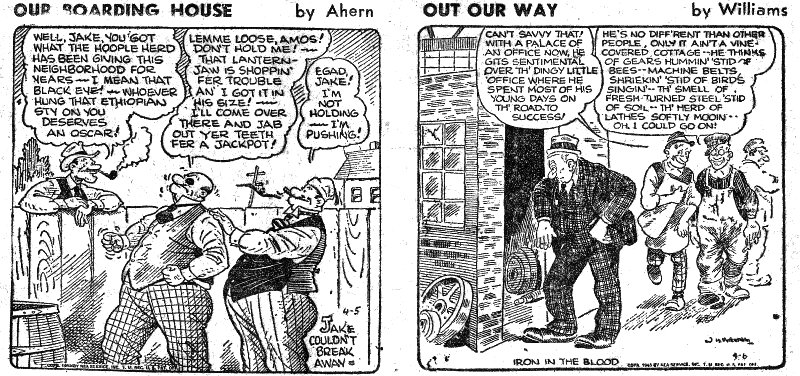
|


|

Says We Bucked
Editor:
In his letter in your issue of June 14, Pfc. John Knobl was right about other outfits sending men home with 85 points or better.
Whoever answered his letter must be bucking for a promotion, as the story about other outfits doing this is not "a wild canard."
The 14th Air Force is sending men home with 85 or better.
When the good breaks come, it will be too late to be appreciated.
Before they set a new "critical score" in July, let them release men with over 85 points.
- Sgt. Vincent Porizo
One Rogers, One Stewart
Editor:
I read with more than casual interest your story, "Assam-made Gin and Rum Pretty Poor," July 5, written by a Lt. Col. Walter Stewart.
Is this the Walter Stewart who was peacetime editor of the Memphis Commercial Appeal? There is little doubt in my mind that these personages are one and the same. There was only one Will Rogers, and one Walter Stewart...
- Sincerely, M/Sgt. William Gurney, Jr., 1305 BU
Ed.-According to a mimeographed list of all PROs in the theater, Lt. Col. Walter L. Stewart, I-B Theater PRO, worked on the Commercial Appeal. So if you've made any best, sergeant, you win.
How About a Rest?
Editor:
In your June 28 issue you had an excellent article on the Darjeeling rest camp. Here, it added insult to injury.
We Chinasiders get letters from buddies in India who're off to Darjeeling for the standard 20-day rest - and from men who're getting two and three week furloughs once a year in Calcutta and other Indian cities.
We can find some reason for our limited, haphazard beer ration - we do know that even expanded Hump tonnage is limited.
But we can't understand our rest camp system here. Furloughs we can't get - something about policy and facilities. Rest camp? We have a monthly quota of two EM and one officer, hardly a fair ration, and that boils down to the fact that a new man can expect rest leave of seven days plus four days travel time, 40 months after he gets here. It's been that way many months!
Right now men are getting their first break after 25 months in CBI. Each month our morale board notes the situation... and each month China wing doles out our three-man quota.
There's publicity all over the world about the go-getting American Army. Action is the keynote. Well, if someone would get off the dime, we might have some ACTION on this matter.
(Signed by 30 of the boys, including No. 1 boy, K barracks, 1338 BU.)
Ed.-We've bucked your letter on to the rest-camp officer and we'll be sweating out, with you, news of a betterment in the situation.
Chess Brainteaser?
Editor:
Here's a suggestion: give chess players among your readers a weekly problem to ponder. I know your first thought will be that not enough guys would work them, but wait a minute. If one guy in a hundred did, that would be 200 guys, and would they appreciate it? (Yes). I have a job that involves a lot of sitting around at night just doing nothing; you can't write letters all the time, and you get sick of books too. Crossword puzzles only take a few minutes to work out, but a good chess puzzle will kill an evening, or maybe ten.
- Assam Swing Shifter
Ed.-Any more of you night workers feel that way? It might take us a while to get the puzzles, but we would get them.
Clean Record
Editor:
While the Army is creating these new ranks, like five-star general, I'd like to suggest a star, or something, for privates doing the jobs of staff-sergeants and left out by the T/O.
I'll be different and not bitch. I've heard a dozen colonels say they regret they can't help us, and I feel they are sincere. I do feel, though, that some of the techs and staffs around me are as out of place as button salesman in Delhi.
I have been in service 34 months, and am due to return soon (100 hours to go) and, frankly, I feel ashamed. There I'll be, with enough medals to make me lopsided, flashing a Pfc. stripe. What can people think except that I either goofed up or goofed off?
All I want is some means of showing my record is clean. Perhaps we could be classified as privates-without-a-bust. But then the WACs would object.
- Yours very truly, Pfc. Roy Upson, R/O, 1345 BU
Go Home in One Piece
Editor:
It is the hope of every pilot flying in ICD to someday go home, and in one piece.
The writer agrees with Maj. Murdock's letter published some time ago, in which he condemned pilot recklessness. I have seen it as a co-pilot.
Would it not be possible to have a definite spot in each issue of the Hump Express to be used by the air safety board, for further promotion of their good work?
It is the opinion of the writer that such a space could be utilized, not only to caution pilots, but to show recognition for records in flying safety.
The writer suggests further that a club could be organized, issuing a certificate of proficiency to the pilots who complete their tour of duty with a perfect accident record.
It is believed that an incentive can be created, and pilots will strive to reduce accidents, fly a safer mission, save more aircraft, and deliver more goods.
- F/O Paul T. Ellis, 1340 BU
Ed.-The greatest incentive a pilot can have for safe flying is the desire to get home - in one piece. If he disregards that, it is not likely that a certificate will help him much.

by S/Sgt. Robert C. Faber |
FLOWING ALONG
Advertising-copy Phewitzer award for June goes to the author of this lyric (LIFE, June 25):
"I'm a music teacher right here in the city of Detroit.
"I've been watching the wheels go 'round for many years and I've learned a lot about this city, its events, its people, and its automobiles.
"If you ask me what recent automobile event I consider the most important, I'd tell you it was in the fall of 1940, when Dodge brought out its All-Fluid Drive...
"This, I believe, made Dodge the greatest car ever built for a young woman to own and drive. Mine just flows along..."
A GI analyst of advertisers' devious methods, who used to run his own agency in Fort Worth, states that the purpose of this is to persuade American males that if a silly old music teacher can appreciate Fluid Drive, why, how much more should it not mean to him, with all his knowledge of mechanics (which every American male figures he was born with). Maybe so. Maybe so.
SCANTS
"Nosey Newshound" writes in the Tea Patch Tribune of the Marlene Dietrich case and says, "What would you ask for if Ethel Barrymore were to offer you her petticoat?" Well, Newsy, we wouldn't figure there was much left to ask for, except lots of people's beer rations, because there would be a big market for such an item, and we would sell it rapidly.
PUDDING'S PROOF
That was a good piece Chaplain Maguire wrote for us last week about men who don't agree being able to live together in amity in our army, as in our civilian homeland.
Maybe as good an illustration of the principle as any is the fact
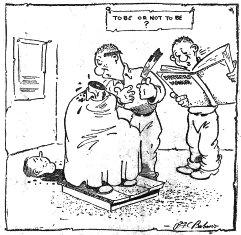 "Ooops, I'm sorry, Sir!"
"Ooops, I'm sorry, Sir!"
|
RAINBOW'S END
Bombay - About 600 Indian Merchant Navy seamen... have arrived in Bombay en route to their hopes.
- Associated Press of India release
JEEPERS
Chungking - The influential newspaper Ta Kung Pao has editorially welcomed the "jeep girls" and urged Chinese women to fraternize with Americans. The newspaper advocated free and open intercourse regardless of nationality.
- United Press of America release to Indian papers
COMPENSATION
I wish Godspeed to the World Charter because without this "world constitution" there is bound to be chaos, destruction and sufferance.
- The Hindusthan Standard of Calcutta
Well, as long as there's plenty of sufferance we'll get by all right.
|
Tire Blows,
Saves Pilot From Harm
Plane on 'Cross-Country' Trip as Brakes Fail
Dum Dum, India - A B-24 was scheduled to land at one of ICD's northern bases, and just before coming in it ran into a low rain-cloud. The pilot tried to get below the cloud and land. Suddenly he felt a distinct shudder go through the plane and heard the tower telling him to stay aloft and to land at another station - that station was 1305.
Coming into 1305, everything seemed normal and apparently a perfect landing was just a routine, but - something had gone wrong.
Just after touching the runway, the huge Liberator took off on a cross-country jubilee, minus hydraulic brake fluid. Across three railroad tracks, half-circling around the crash-crew buildings, through a parking lot, and directly towards a large group of parked aircraft, headed the runaway plane.
Then, as if God himself took immediate charge, the nose-wheel tire blew out, and swerved the speeding ship into a perfect parking spot, with no damage to any other property.
The pilot crawled out and found that the outward part of the right wing-tip had been sheared away, and a large hole was showing in the main right wing. From the wheel on out to the wing-tip, the section was strewn with pieces of tree and foliage. In the right wheel structure, the pilot found the remains of three dead birds.
When the realization of how low he had been flying in his first landing effort was added to the shock of his second experience, he said, "I damn near fainted. My heart stopped beating."
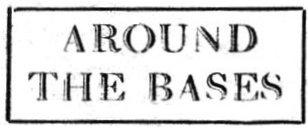 THE LITTLE DEER
THE LITTLE DEER
1338 BU, China - GIs here who feel the urge to "get away from it all" now are offered a full-fledged, three-day hunting trip, complete with all the necessary hunting paraphernalia including a jeep, rations, guns and shells, and a free briefing. Latest offering of special service, the trip not only promises a little nerve-rest but a change of menu as well. So far, one deer, of the small "barking" breed, is the total gain of the four GI hunters who have taken the trip.
CALLING RIPLEY
Lalmanir Hat, India - Latest brainchild of Pfc. Bill Mondadori and Sgt. Hank Woike, instrument shop, is a "doozer" of a Rube Goldberg invention. The waggish inventors call it an "altimeter warning device," and here's what it does:
When a plane gets 1,000 feet over the runway a bell rings, a bulb lights and a horn blows, indicating that it is time to put the landing gear down. Then if the pilot makes a good landing, an arm reaches out from the rear
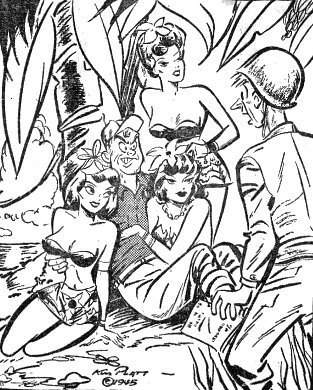 "My replacement? Who th' hell wants a replacement?"
"My replacement? Who th' hell wants a replacement?"
|
The inventors also dream up practical aids, recently devising an auto-pilot mock-up and test stand that simulates all flight conditions, enabling them to test each unit in the auto-pilot, the gyros and the entire system.
DISGUSTED
1351 BU, Kurmitola, India - Pfc. Leonard Weinberg, a recent arrival here, spent several days sweating out an assignment. Prospects of passing the time looked much better when he saw a sign marked "Library" in the headquarters building. Weisberg, a voracious reader, figured he would have a good source of reading material when his own meager stock ran out. That didn't take long, so he walked confidently into the "Library" room and asked the tech sergeant librarian where the fiction was. There wasn't any. In fact, there wasn't anything but rows of big black volumes of tech orders. Now Weinberg doesn't believe in signs.
POPULARITY PAYS
1305 BU, Calcutta - When Maj. Clyde H. Courtwright, former director of priorities and traffic here, left for China, the entire staff turned out for a farewell party. The fete had its take-off at the Officers Club bar. Then Lt. Col. Clayton E. Joyce, 1305 CO, moved the party to his private quarters for an honest-to-goodness steak dinner, and took time out to commend Maj. Courtwright. Maj. Wilson A. Burdett, formerly with the Central African Division, has assumed the P & T directorship here.
HUMP EXPRESS is the official newspaper of the India-China Division, Air Transport Command, APO 192, c/o Postmaster, New York, N.Y., and is published by its Public Relations office. Camp Newspaper Service and Army Newspaper Service features are used, reproduction of which is prohibited without permission of CNS and ANS, 205 East 42nd St., New York, 17, N.Y. Other material is submitted by staff members, ICD-ATC base Public Relations sections and other soldier correspondents. Printed weekly by the Hindusthan Standard, 3 Burman St., Calcutta, India, and distributed each Thursday. Passed by U.S. Press Censor for mailing.
| Military transport schedules over India for cargo, personnel and mail . . . maximum tonnage of essential war materials over the Hump . . . movement of troops and supplies in support of tactical operations in China . . . evacuation of the sick and wounded - these are the missions of ICD-ATC. |

JULY 12, 1945
Original issue of HUMP EXPRESS shared by CBI veteran Steven C. King, author of Flying the Hump to China.
Copyright © 2007 Carl Warren Weidenburner
TOP OF PAGE PRINT THIS PAGE ABOUT THIS PAGE E-MAIL YOUR COMMENTS
PREVIOUS ISSUE HUMP EXPRESS BASE NEXT ISSUE
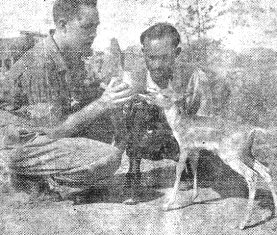 Agra, India - Like most GIs, "Bambi" seems to think there's nothing like a little jungle ration on a hot Indian day.
Mascot of the 1303 motor pool, the baby deer is shown here getting its daily cup of bovine juice from the owner,
Pfc. James Young.
Agra, India - Like most GIs, "Bambi" seems to think there's nothing like a little jungle ration on a hot Indian day.
Mascot of the 1303 motor pool, the baby deer is shown here getting its daily cup of bovine juice from the owner,
Pfc. James Young.
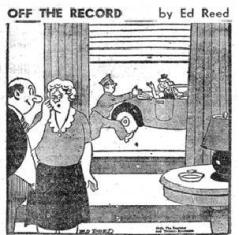
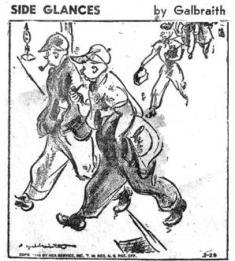
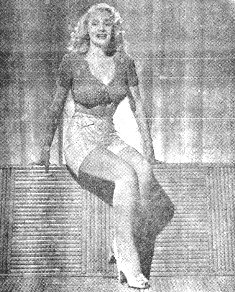 This picture of Marie Wilson should make everybody feel right at home, what with the bamboo backdrop and stuff.
All this reminds one of an old song which didn't go like this, "Marie, may back is aching."
This picture of Marie Wilson should make everybody feel right at home, what with the bamboo backdrop and stuff.
All this reminds one of an old song which didn't go like this, "Marie, may back is aching."